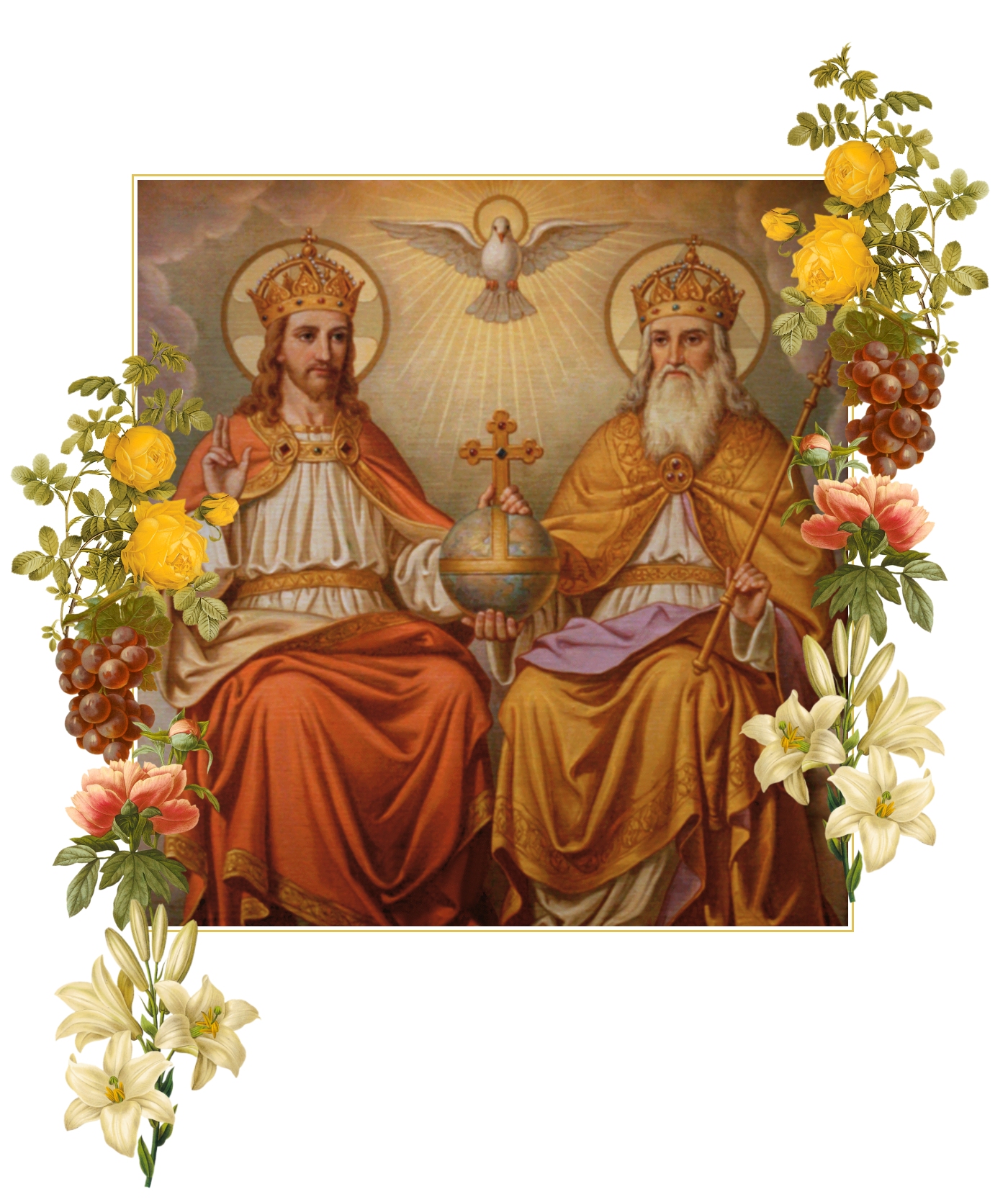
 The Beauty and Truth of the Catholic Church Vol. IV B. Herder, St. Louis, MO, 1816 Fr. Edward Jones With Imprimatur and Nihil Obstat, 1916 The Mystery of the Most Blessed Trinity
Finally, if God is our highest Lawgiver, Whose will is the supreme rule according to which we must live and act, and the rule according to which He, as the Supreme Judge, punishes transgressors, and rewards the obedient, and shows Himself to be our Last End, in this again we have a proof that there can be only one God. For if there were several gods, there would be various laws, rewards from the one, punishment from the other, confusion without end, and contradictions, and no one would be able to satisfy the longings of his soul for perfect peace and happiness. Were these proofs, together with the testimony of the whole world and of our own soul, not sufficient to convince us of the unity of God, Holy Scripture would assuredly be sufficient. The unity of God was the principal and fundamental teaching of the Old Testament. For the preservation on earth of this primary truth of faith the people of Israel were chosen; and because among all other nations paganism, and with it faith in various gods flourished, God led the Israelites into the wilderness, prevented all intercourse with the pagans for forty years, surrounded His chosen people with a multitude of religious and ceremonial precepts, as with an impenetrable wall, nor did He permit them to enter into the Promised Land until these laws and precepts had become part and parcel of their customs. For the same reason the Israelites were not permitted, even in the Holy Land itself, to have more than one, High Priest, and only one place of sacrifice was permitted to them, namely, the tabernacle, and later on the Temple, to which they had to go three times a year, in order that a living faith in one God might be preserved among them. Christ also confirmed this belief. To spread the belief in the unity of God, and to rescue the pagans from idolatry, was the first and immediate task of the Apostles. The Martyrs defended this truth with their blood. Faith in one God is our consolation. We have only one God to love, to adore, to serve, in order to be saved. And yet we believe, and this faith is necessary for eternal life, the mystery that God is One in His Nature and Substance, but Three in Person: "There are Three Who give testimony in Heaven, the Father, the Word, and the Holy Ghost. And these Three are one." Therefore we will today consider the mystery of the Most Blessed Trinity, under the following divisions: 1, how the Trinity was revealed; 2, what we understand by the Divine Nature and Substance, and what we understand by Divine Persons; 3, we shall try to make this mystery more intelligible; 4, and show what works are usually attributed to each of the Divine Persons, and why. O Jesus, assist us with Thy grace! 1. The mystery of the Most Blessed Trinity was not distinctly proclaimed in the Old Testament to the patriarchs and the people of Israel. One reason was, as has been already stated, because they were surrounded by idolatrous nations, and were under especial obligation to preserve faith in the unity of God, and because in spite of strict religious precepts and repeated punishments they could hardly be restrained from idolatry. Another reason was, that just as entrance into the Holy of Holies in the temple, and the sight of the Ark of the Covenant was denied to this people, so was also the insight into the deeper Divine revelations denied them until the coming of the Savior. Nevertheless we find in the Old Testament many references to this sublime mystery of faith, as for example in the narration of the creation of man, where God says: "Let us make man to our own image and likeness" [Gen. 1, 26]. In the Psalms, and, later, in the prophets, are found still clearer traces of this mystery. As we approach more nearly to the time of the coming of our Savior, we behold this inclination to idolatry among the Jewish people gradually disappearing, and the faith in one God becoming more firmly rooted. And so we discover among the Jews just previous to the coming of the Savior that the faith in the Triune God becomes more general, particularly among the better and more righteous classes. For instance, the venerable Simeon, Zachary, Elizabeth, John the Baptist, Joseph and Mary. The Angel who brought the message to Mary did not surprise her by the reference to the Son and the Holy Ghost, and just as little were the others surprised by it. But the doctrine that in God there are three Persons was first formally and in definite expression revealed by Our Divine Savior in the New Testament. And since men were so strongly convinced of this truth, Our Divine Savior, although He encountered many objections to His teachings among the Jews, in precisely this doctrine met with none. Let us admire here the Providence of God, which as it gradually, and ever more perfectly prepared mankind for the coming of the Savior, so in like manner also led him gradually to the faith in this sublime mystery of the Trinity of God. As the faith in one God re-echoed in majestic and awe-inspiring proclamation from Mt. Sinai as the first Commandment, so in the New Law is revealed in a more sublime manner the mystery of the Most Blessed Trinity. It is revealed by the message of the Angel, by the Baptism of Christ, by the sending of the Apostles to Baptize all who believe, in the name of God, the Father, the Son, and. Holy Ghost, and by the promise of Our Blessed Savior to send the Holy Ghost. On Pentecost day belief in this mystery was proclaimed to the Jews and heathens, and to the whole world, as the first condition of salvation. Consequently we see that from that time the Apostles preach, teach, Baptize, and bless in this name. "The grace of our Lord Jesus Christ, and the charity of God, and the communication of the Holy Ghost be with you all" [2 Cor. 13, 13]. The successors of the Apostles proclaimed this belief, the Martyrs confessed it before the tribunals of the pagans. "Lord God, almighty, eternal Father of Thy Beloved and Blessed Son Jesus Christ"-----thus prayed in the year 166 A.D. the octogenarian Bishop of Smyrna, the Martyr St. Polycarp,-----"I thank Thee that Thou hast deemed me worthy to live to this hour when I shall be numbered among the holy Martyrs, and enjoy the happiness of sharing in the chalice of Thy Son Jesus Christ, in order to be renewed for the resurrection unto eternal life of body and soul, through Thy Holy Spirit. Accept me this day as an acceptable holocaust that Thou hast prepared for Thyself . . . Therefore I praise Thee above all things. I praise and glorify Thee through the Eternal High Priest, Jesus Christ, Thy Beloved Son, to Whom with Thee and the Holy Ghost be glory for ever and ever." This faith of the Apostles
and Martyrs spreading throughout the world, destroyed the temples and
altars
of paganism, demolished their idols, and converted the nations.
Nineteen
centuries have passed away since this faith was revealed, and mankind
and 2. And now, my friends, what do we understand by being and nature, and what by person? We must understand in some measure the meaning of these terms in order not to have a confused idea of the Most Holy Trinity. We number as many substances as we do beings. Three men are undoubtedly three substances, because each one has his own being distinct from every other. And so there are not three Divine Substances, because there is only one Divine Nature and Being. The being or nature comprises within itself all the attributes which belong to a substance. The Divine Nature, therefore, comprises within Itself all the Divine attributes, eternity, omnipotence, omniscience, omnipresence, wisdom, holiness, and so on. And as there is only one eternity, one omnipotence, one wisdom, so there is but one Divine Nature and Being. Therefore the Father, the Son, and the Holy Ghost, are not three Gods, but only one God, and so we say; "I believe in one God." But if they are only one God, they have only one Divine Nature or Being in common, that is they are equally eternal, equally omnipotent, omnipresent, omniscient. Therefore not three omnipotent, not three omnipresent, not three all-knowing, but one omnipotent, one eternal, one all-knowing, just, holy God. In consequence, each Divine Person possesses in their plenitude all and the same Divine attributes as the other Divine Persons. Therefore the Father is not more omnipotent, more eternal, more omniscient, more holy and just than the Son, nor is the Son more so than the Holy Ghost, but each and every one of the Divine Persons has the same Divine attributes, one and the same indivisible Nature and Being. And because each Divine Person possesses the indivisible Divine Nature whole and entire, it follows that the Father is true God, and the Son and Holy Ghost are true God, and yet they are not three Gods, but one Triune God. Therefore Christ says: "I and the Father are one." He does not say of one, but one, that is, one and the same Divine Nature and Being. And now what is a person?
A person is an individual substance, which is a principle of action in
a rational nature, that is endowed with understanding and free will.
Man
is a person, because he does not exist in another being, but by
himself,
and is master In what then consists the distinction between the Father, the Son, and the Holy Ghost? There can be no distinction in the one indivisible Nature and Being, because each Divine Person possesses the same Divine attributes. But if there were no difference between the Divine Persons, there would be evidently not three, but only one Person. There must therefore be a difference. It is not in the Being, but in the Persons. The Father, the Son, and the Holy Ghost are different as to Person. "The Father is from no one, the Son is from the Father alone, and the Holy Ghost is equally from both"-----this is the doctrine of our holy faith [IV Conc. Lat. cap. firm.]. The Father is, therefore, not the Son, the Son is not the Father, and neither the Father nor the Son is the Holy Ghost. Herein consists a real difference according to Persons. But how is the mystery of the Trinity explained? We say explained, not proved, for it is sufficiently proved by the revelation of God, by the Incarnation of the Son of God, and by the coming of the Holy Ghost. The whole of Christendom is penetrated with the truth of this mystery, so that it is truly effective for the salvation of the world. Grace, the power of the Sacraments, Divine service, all have their virtue in this mystery, and as everything is done in this Name, in everything is this mystery professed and glorified. It shows God not only in His relation to us and to the world, but also in His relation to Himself, in His own innermost Life, in the Sanctity of His Eternal Majesty. We shall briefly explain this and endeavor to make it clearer by comparisons. If all life is from God, and if God is Himself the highest eternal Life, it follows that He would not be wrapped up within Himself in utter inactivity. For even created life is active, not only externally, but also internally. The soul for instance is active not only in the movement of the body, but also in its own self by thinking and willing. In the same manner the body is active internally and externally. But God as the true, the highest Life, must also exhibit the highest activity not only externally, in regard to the world, but also internally, in His Own Divine Being. What would the body, what would the soul be without eternal life? A dead and lifeless thing. What would be the life of God if He did not possess it with knowledge and love, which is the greatest activity? The first of the Divine Persons, the Father, comprehends Himself and His Divine Being with perfect clearness. In consequence of this eternal perception and comprehension of Self, He begets in Himself an eternal living picture of Himself, in which is a perfect reproduction of His whole Being, and this likeness, this other Being from Himself is the Son, Who is "the brightness of the glory of the Father and the figure of His substance," as St. Paul expresses it [Heb. 1, 3], Who is the Wisdom of the Father, and the Word of God which He spoke in Himself, and which is a perfect likeness of Himself. As a weak comparison, we may consider a man beholding himself in a mirror which gives him a picture of himself at a glance, without any effort on his part. In this case there is only a reflection, but in the case of God the Father there is a perfect likeness, which is not only His image, but His whole Being Itself. Inasmuch as the Father in this manner begets the Son, He loves the Son with an endless, infinite love, and the Son loves the Father with a like love. This mutual love, infinite and supremely perfect, is a Person, the third Person of the Blessed Trinity, the Holy Ghost. And so we say that the Holy Ghost proceeds from the Father and the Son. We poor mortals cannot comprehend this mystery, but whilst we explain it we adore and believe it. Our intellect gives us to understand that God is incomprehensible, and that it is our glory and grace to believe before we see. And from this we can understand, my beloved, that God could live for an eternity before there were any created beings, and that He did live from all eternity in the most perfect happiness, and that He can live without creatures. 3. Although the Son is begotten by the Father, and the Holy Ghost proceeds from the Father and the Son, yet, since the Son and the Holy Ghost have the same substance and Nature as the Father, they, too, are from eternity just as the Father is from eternity. St. Augustine, in the fourth century, tried to make this truth more intelligible to his hearers in the following manner: fire generates a radiance which is just as old as the fire itself. Give me an eternal fire, and I will give you an eternal radiance. In like manner a light sheds a glimmer as old as the light itself. The fire has its radiance, the light begets a glimmer, but the fire did not exist a moment before the radiance, nor the light before the glimmer it sheds. Behold how fire with its radiance, and light with its glimmer come into existence simultaneously, and doubt not that the Son exists with the Father from all eternity, "Being the brightness of His glory and the figure of His substance" [Heb. 1, 3]. Tertullian, who lived in the second century, made use of the sun as an illustration. There is only one sun, but we distinguish three things in it, the sun, the rays generated by it, and the heat that proceeds from the sun and the rays. Give me, therefore, an eternal sun, and I will give you an eternal beam, and an eternal warmth proceeding from both. But, my beloved, why demand more illustrations, from nature? Has not the Most Holy Trinity made man, as it were, a mirror wherein we in a measure may contemplate the nature of the Trinity? Again St. Augustine teaches: The soul has understanding, memory, and free will. But in the understanding, in the memory and in the will, it is one and the same soul, one and the same substance. And yet the understanding is different from the memory, the memory from the will, but still the substance which has understanding is not different from that which has memory and will. It is the same soul which is internally and externally active through these different faculties. Thus in a much higher degree the Divine Nature and Substance are one and the same in the three Divine Persons. The Persons, though not the Nature, are distinguished by their personal qualifications. St. Augustine continues: The understanding that generates knowledge, or the Word, is the image of the Father; the knowledge or the Word, generated by the Father is the image of the Son, and the love of the will, which, to a certain extent, proceeds from the understanding and the knowledge, the image of the Holy Ghost [De Trin. Bk. IX, c. 12]. In our meditations on the infinite perfections of God we saw that created things are signs whereby we are guided to God, that they give us but a faint hint of the glory of God, enlightened by which we obtain some idea of His eternal beauty, "For by the greatness of the beauty, and of the creature, the creator of them may be seen so as to be known thereby" [Wis. 13, 5]. Thus also in a special manner man is a mirror in which we, enlightened by faith, can in a measure comprehend the mystery of the Blessed Trinity. The soul in which the breath of God lives is this mirror, the soul whose substance is as much concealed from our eyes as the substance of God; the soul, simple, indivisible, without extension, independent of time and place, free in its action, seeking after its own happiness, yet revealing itself under a three-fold power, as it were, a small trinity in itself. Therefore just as it is reprehensible to deny the existence of the soul because we cannot see it nor fully understand its substance, so it is reprehensible in even a greater degree to deny that most sublime mystery of our faith, the Most Holy Trinity, because we cannot comprehend it, or because it surpasses our understanding. For that it is not against reason, or unreasonable, the smallest child apprehends, because it knows that this mystery has been revealed by the Highest Intelligence and Wisdom, God Himself. 4. But we wish still to
consider, my beloved, what works are ascribed to each of the Divine
Persons.
Although the Divine perfections, the wisdom, omnipotence, justice,
holiness,
etc., which are revealed in created things, belong alike to all the
Divine
Persons, The works of wisdom, but especially the work of redemption is ascribed to the Son. Since the Father begot the Son through the comprehension of Himself, and since the Son is thereby the Internal Word, the expression of all things knowable and the substantial likeness of the Father, to the Son wisdom stands in a particular relation. In the omnipotence which reveals itself in the creation of the world we recognize the Father, but in the wisdom displayed in the creation we behold the Son, for "through Him all things were made." As the artist through the exercise of his understanding designs the plan of a work, so the Father, through the Son in Whom He knows all things, created this universe with its marvelous order. This order was destroyed by sin, therefore it is the Son Who by His Incarnation restored it. The Redemption is therefore peculiar to Him, for only the Second Person of the Blessed Trinity became man, and Our Savior. Therefore He Who with eternal wisdom introduced the original order that was in the world, has also restored it, and will in His eternal wisdom make the restoration of order still more complete on the last day. Finally, the works of love, and especially of sanctification, are ascribed to the Holy Ghost. Love is the highest activity of the will, wherefore is the Holy Ghost the mutual Love of the Father and the Son. Although all three Divine Persons love us, we can say that this is true in a special degree of the Holy Ghost, because He is Love itself. Love manifests itself by good works and benevolence; hence all the works of Divine goodness are ascribed especially to the Holy Ghost. If omnipotence is remarkable in the creation of the universe out of nothing, wisdom discernible in the introduction of the most marvelous order, then truly does love make itself known by the supplying of all that is needful or profitable. For this reason is the life-giving activity which was present in the creation ascribed to the Holy Ghost. The Holy Scripture says: "The Spirit of God moved over the waters," Who, hovering over the original creation, gave vitality to all things. And so to-day the Holy Ghost hovers over the new order introduced by the Son of God on earth, over the Holy Catholic Church, which He fills with energy and vitality for the salvation of men, and through whose teaching and Sacraments He operates in the souls of the faithful. This is the reason why we confess: "The Father hath created us, the Son redeemed us, and the Holy Ghost sanctified us." 5. Therefore, my beloved in Christ, may you also in reverence before this deepest and most wonderful of mysteries of our holy religion, prostrate in deepest adoration, be mindful of the infinite mercy of the Father Who created us out of nothing to His own likeness, Who did not spare His only begotten Son but sacrificed Him for us, and Who chose us for His children in preference to millions of other human beings. We should be always mindful of these things and gratefully say: O Lord, I believe; O Lord, I hope; O Lord, I love Thee with my whole heart. May we all be ever mindful of the love of the Son of God Who, with the words addressed to His Heavenly Father: "Behold I come to do Thy will," delivered Himself for us a sacrifice for our redemption, and Who still continues to give Himself to us as food in the Blessed Sacrament of the Altar. To requite this love with love and obedience will lead us to the bliss of Heaven. And may we be mindful of
the love of the Holy Ghost and consecrate ourselves to Him in order
that
He may ever hover over us and open to us the treasury of graces won for
us by the merits of Christ, and the seven great fountains of grace, the
seven Sacraments. Then in truth will the sign of the Cross be a real
profession
of our faith, our hope and our love, whereby the Triune God may
recognize
us as His Own, may look down upon us with grace and mercy, and on the
day
of judgment and reward place us among His elect. Amen.  E-MAIL E-MAIL HOME----------CHRIST THE KING-----------GALLERIES www.catholictradition.org/Easter/easter8.htm |